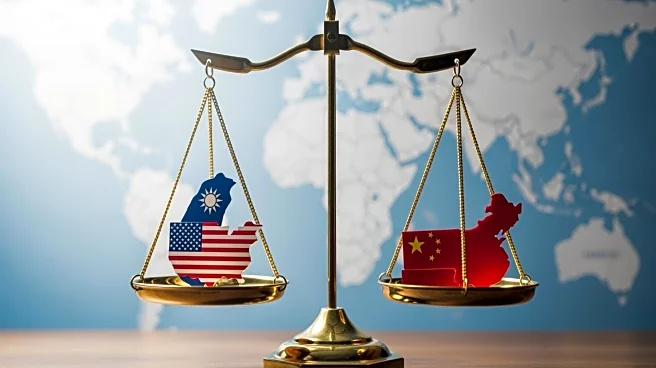What's Happening?
Time Magazine has published a series of articles advocating for a more appeasement-oriented approach towards Taiwan, sparking backlash from Taiwanese officials and citizens. The articles, authored by Lyle
Goldstein, Zhou Bo, and Charlie Campbell, criticize Taiwan's President Lai Ching-te for his pro-independence stance, suggesting that his actions could provoke tensions with China. The articles appear to be timed ahead of a meeting between U.S. President Trump and Chinese President Xi Jinping, potentially influencing U.S. policy decisions regarding Taiwan.
Why It's Important?
The publication's stance has significant implications for U.S.-China relations and Taiwan's international standing. By framing Taiwan's leadership as provocative, Time Magazine's articles could sway public opinion and policy decisions in the U.S., potentially affecting military and diplomatic support for Taiwan. This narrative may also embolden China's position on Taiwan, impacting cross-strait relations and regional stability. The exclusion of Taiwanese voices in the discussion highlights ongoing challenges in international media representation and geopolitical discourse.
What's Next?
The upcoming meeting between President Trump and President Xi Jinping will be crucial in determining the future of U.S.-Taiwan relations. The articles may influence Trump's approach, potentially leading to a shift in U.S. policy towards Taiwan. Taiwanese officials and citizens are likely to continue voicing their concerns, advocating for international support and recognition of Taiwan's sovereignty. The situation underscores the need for balanced media coverage and informed policy-making in addressing complex geopolitical issues.
Beyond the Headlines
The articles reflect broader geopolitical dynamics, where Taiwan's status is often viewed through the lens of U.S.-China power struggles. The portrayal of Taiwan as a provocateur may reinforce imperialistic narratives, sidelining the island's agency and aspirations. This discourse raises ethical questions about media influence on international relations and the responsibility of publications to provide diverse perspectives.










